Frankfurt There was initially a lot of approval for the historic rate hike by the European Central Bank (ECB) on Thursday: by economists, especially from the banking sector, but also, for example, by Ifo boss Clemens Fuest. But in the meantime, a mixed mood is emerging: now more and more experts are expressing concerns.
Achim Truger, who is a member of the council of experts, the so-called economic experts, on the recommendation of the unions, wrote in the short message service Twitter: “Record interest rate hike and recession forecast – is that a good combination? Hopefully that goes well…” His colleague Gustav Horn, who sits on the federal executive committee of the SPD, expressed a similar view: “The rate hikes by the ECB are exaggerated. So far there has been no wage-price spiral, which implies falling purchasing power.”
The phenomenon describes a development in which workers demand higher wages to compensate for the loss of purchasing power as a result of higher prices. This in turn increases the costs for companies, which pass them on to their customers in the form of price increases.
Inflation in the euro area reached a record high of 9.1 percent in August. In order to curb inflation, the ECB announced a record interest rate hike on Thursday: it raised interest rates by 0.75 percentage points, bringing the key interest rate to 1.25 percent and the deposit rate to 0.75 percent.
Top jobs of the day
Find the best jobs now and
be notified by email.
Silke Tober, monetary policy expert at the IMK Institute, which is close to the trade unions, considers the increase in ECB interest rates to be fundamentally justified. But ECB President Christine Lagarde’s commitment to up to four further rate hikes is risky in her view. In addition, Tober said in a virtual conference of the Expert network “The Early Editor Club”: “I think it is a mistake that Lagarde spoke of a monetary policy error.”
Record rate hike and recession forecast – is that a happy combination…?!?👇
Hope it goes well! pic.twitter.com/i1KjgpMJ90— Achim Truger (@AchimTruger) September 8, 2022
The central bank also revised its inflation forecast significantly upwards on Thursday. Lagarde admitted mistakes in the forecasts during the press conference and took responsibility “as head of the institution”. At the same time, however, she also pointed out that many economists were wrong in their forecasts and that the consequences of the Ukraine war and the resulting increase in energy prices could hardly have been foreseen.
Tober believes that the ECB had no chance to offset the impact of higher energy prices on inflation anyway. She fears that by admitting a mistake, the ECB is putting itself under pressure to fight price hikes, which come from the supply side and are therefore difficult to influence.
This, in turn, could rob it of the flexibility it needs to respond to a severe recession, according to Tober. In addition to the inflation forecast, the ECB has also corrected its growth forecast: In the event of poor economic development, it now predicts a contraction of the economy in the euro area by 0.9 percent for 2023, in the basic scenario it is now assuming a plus of 0.9 percent off.
Jens Suedekum, an economist who teaches in Düsseldorf and who is usually associated with the left wing politically, expressed similar concerns. On Friday, he exchanged blows with German colleague Rudi Bachmann, who teaches at the US University of Notre Dame.
While Bachmann represents the logic, with a shrinking supply – for example with lower energy supplies – If monetary policy has to dampen demand accordingly in order to restore price equilibrium, Suedekum fears above all that the ECB will not react in time to the weak economic development and will tighten interest rates further.
Inverted yield curve in the US
The markets are also showing a mixed picture. While the euro exchange rate and the shares hardly reacted to the interest rate hike, the yield on the ten-year federal bond rose significantly on Thursday, but fell again on Friday and was 1.66 percent in the afternoon.
>> Read here: ECB fights record inflation with historic rate hike
There is generally an inverted yield curve on the capital markets, with bonds with shorter maturities yielding more than those with longer maturities, as a harbinger of a recession. The logic behind it: From such a yield curve it can be seen that investors are expecting falling returns because normally long maturities should yield more than short maturities – to compensate for the longer capital commitment.
Bunds are not inverting, but there is in the US, where five-year and even two-year yields are higher than 10-year yields. This is remarkable, since Europe has been hit harder by the consequences of the war than the USA – and is therefore exposed to a higher risk of recession.
Looking at the mostly trend-setting US markets, investors therefore expect a recession and ultimately also a reversal of monetary policy. Ariel Bezalel, head of bonds at Jupiter Asset Management in London, told the Handelsblatt along the same lines: “We are only at the beginning of a hard slowdown in the economy. Inflation cannot continue without growth, so we expect central banks to turn around.”
More: Commentary on the ECB decision: operation damage limitation
